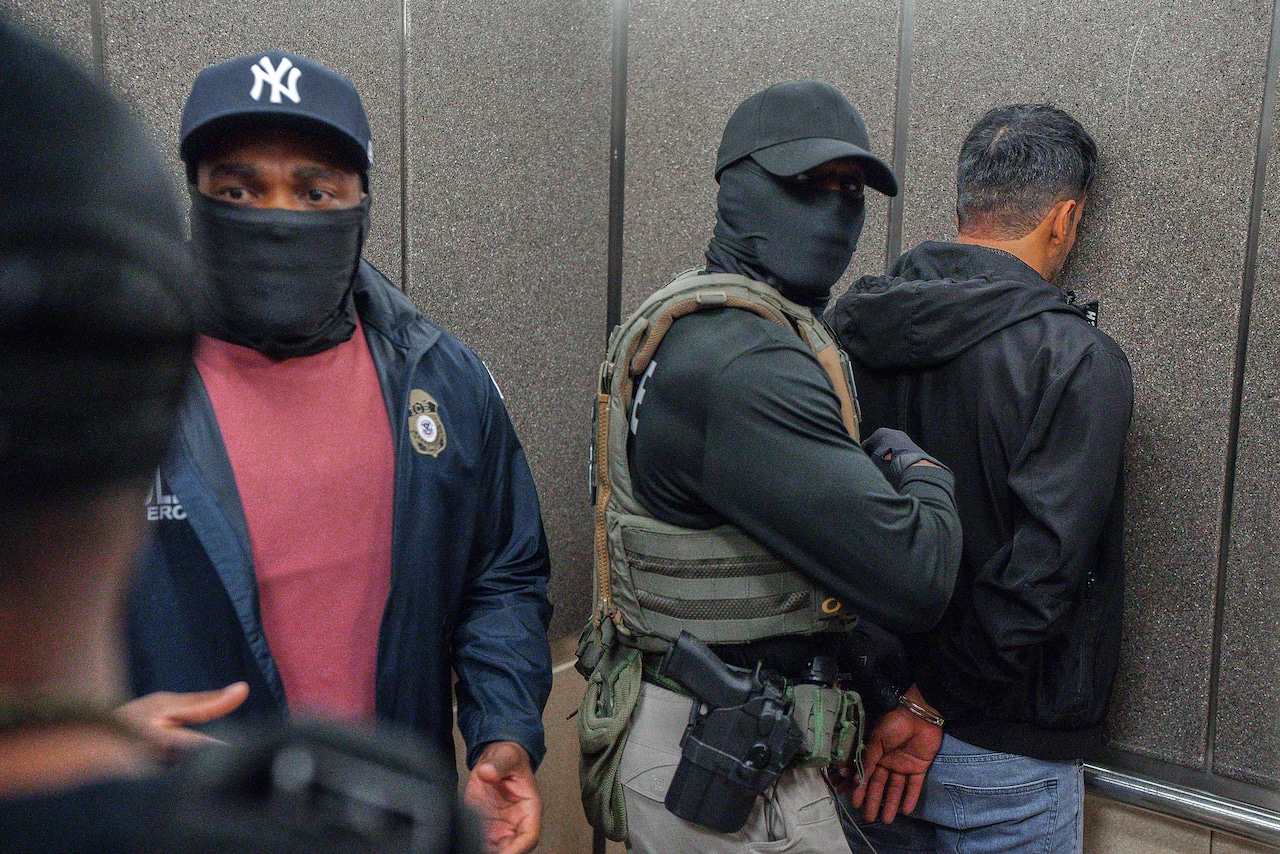Copyright M Live Michigan

With few exceptions, ICE agents would be banned from wearing masks and from conducting immigration enforcement in churches, hospitals and schools under legislation from Michigan Senate Democrats. The three-bill package would also bar local and state police from sharing identifying information about people with ICE if the information was requested for immigration enforcement purposes and wasn’t requested with a warrant. Lawmakers heard testimony on the bills during a Senate Civil Rights, Judiciary and Public Safety Committee meeting on Thursday, Nov. 6, but did not take a vote to move it out of committee. If later passed by Democratic-controlled Senate, the bill package is unlikely to pass the Republican-controlled House. Legislation sponsors say their bills are necessary to protect the privacy of residents, ensure law enforcement is identifiable and held accountable and that spaces for health, worship and education are protected. The proposed protections come amid President Donald Trump’s crackdown on illegal immigration across the country. Under the legislation, federal agents would be forbidden from conducting immigration enforcement actions at “sensitive locations” anywhere in the state unless they had a court order to enter the location or if the action was necessary to address an imminent danger to public safety. These sensitive locations include places of worship, hospitals, courthouses, public and private schools and universities and organizations assisting children, pregnant women, victims of crime or abuse or individuals with mental or physical disabilities. Funerals, weddings and other public religious ceremonies would also be protected. The push for sensitive locations comes a day after ICE agents – one of them masked – chased a teacher at a Chicago daycare into her place of work and dragged her outside to detain her, WGN-TV reported. Reuters reported the agents grabbed the teacher in front of children at the daycare and did not have a warrant. Bill sponsor state Sen. Mary Cavanagh, D-Redford Township, said sensitive locations had been protected since 1993 under both Democratic and Republican presidential administrations, but those protections were stripped away earlier this year. “The result has been a decline in public safety, public health and educational stability,” Cavanagh said. “Families are afraid to send their children to school or attend medical appointments. Individuals are afraid to go to court dates. Victims and witnesses are terrified to report crimes regardless of their immigration status, a fear of just being detained or their family members never seeing them again. When families are afraid to call the police, attend hearings, or seek medical care, our communities aren’t safer. They produce more public fear and uncertainty.” State Sen. Jim Runestad, R-White Lake, argued that a person in the country illegally who committed a homicide would be shielded from law enforcement by hiding in a sensitive location. The bill does not prevent enforcement of state and local laws at sensitive locations and allows for immigration enforcement actions if there’s a threat to public safety. Runestad, the sole Republican present after state Sen. Ruth Johnson, R-Holly, was absent, argued at times with colleagues and those testifying throughout the hearing Thursday, resulting in him being gaveled down at least once. Among other things, he took issue with testimony that he said conflated illegal immigration with legal immigration. The proposed prohibition on use of masks by law enforcement in the state mirrors a similar bill introduced earlier this year in the Michigan House. The Senate bill would mandate that all law enforcement officers, including ICE agents, wear a uniform with their name or badge number and not wear a mask or other disguise while on duty and interacting with a member of the public. The legislation provides exceptions for officers that are undercover. It also exempts masks worn to prevent the transmission of airborne disease and those worn to protect an officer’s face or the officer from airborne toxins. Bill sponsor state Sen. Jeremy Moss, D-Southfield, said the mission of law enforcement to protect the public comes with powers not granted to the general public. “This mission requires trust with the public, accountability for actions while on duty, and the ability to clearly and easily determine who is granted these extraordinary powers,” Moss said. “That trust is undermined by law enforcement officers who conceal their identity and their uniform.” Trump administration officials have said concealing the identity of ICE officers with masks is needed to safeguard them. They say ICE officers and their families have been harassed or threatened in public and online after an officer’s identity is uncovered. Runestad echoed those concerns, saying ICE agents and their families face increased danger. He later said he doesn’t like the idea of ICE agents being masked but was conflicted because of the threats they face. “With the horrific threats and even actions against these people,” Runestad said. “I’m not sure exactly how to do it. I do not like the idea of them wearing masks, but I don’t know how to solve the problem.” The use of plain clothes and masks by ICE agents has also made it easy for criminals to present themselves as law enforcement, Moss said. The final bill in the package would prevent government entities in the state from providing an individual’s identifying information to a person without a warrant if it is suspected that the information would be used to enforce federal immigration law. Identifying information includes a person’s image, name, address, driver’s license number, Social Security number, telephone number. The legislation would bar state and local police from providing identifying information to ICE of people they have detained or arrested if ICE doesn’t have a warrant for the information. Committee Chair state Sen. Stephanie Chang, D-Detroit, sponsored the identification bill.



